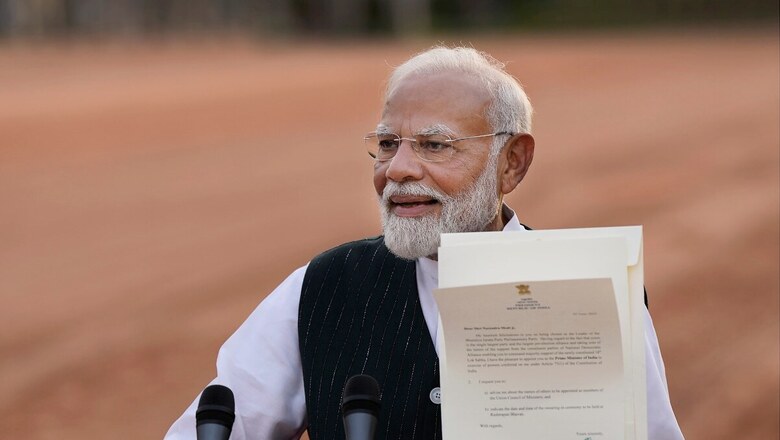
views
A lot has transpired since Prime Minister Modi’s re-election earlier this month. It wasn’t a straightforward victory as the ruling party, the BJP, has not secured an absolute majority on its own in the Lok Sabha or the House of Representatives for the first time under Modi. It fell short of around 30 odd seats to hit the magic mark of 272 raising hopes among the opposition, and Modi’s detractors abroad that perhaps there was indeed a chance to replace the current government finally. But Modi had allies who had signed up to be part of the National Democratic Alliance, the NDA, much before the elections even started. The two biggest parties here were the JD(U) from the state of Bihar which secured 12 seats and the TDP in Andhra Pradesh which had 16. They both wasted little time to swear their allegiance, which then set the stage for the third consecutive government under Modi. With 293 seats out of 543, though down from 340 in 2019, the Modi government remains formidably strong. The resurgence witnessed by the opposition has fallen short, and a stable Modi government is likely to be the case for the next five years.
This raised the question as to whether the nature of this government would change. Well, from the looks of the unchanged top-tier of his cabinet of ministers, Modi has signalled towards continuity. Most importantly, the signal from New Delhi is that its foreign policy direction will remain the same. After all, S Jaishankar will continue to be India’s External Affairs Minister. That means a continuation of India’s strict stance against China’s aggression at the borders. India and China have been locked in a standoff in the Himalayan border, with heavy military buildup, for more than four years now.
This year-round standoff is tremendously expensive for both sides, exerting pressure on not just their finances but also their forces who have ensured multiple winters at Himalayan sub-zero temperatures to hold their positions. Repeated talks have ended without a settlement. Neither side has blinked. And if China hoped that a change of guard, a weaker coalition government in New Delhi with perhaps relatively friendly leaders at the helm, would strengthen its position against India — that has not happened.
Instead, with a grand return to power, it is Modi’s hand that has been strengthened against Xi, who is left with no choice for another five years but to deal with Modi at the helm in New Delhi.
So it come as no surprise that Xi’s name was missing from the list of world leaders that sent their wishes to Modi. From the UK’s Rishi Sunak to French President Macron, German Chancellor Olaf Scholz, US President Joe Biden, and Russia’s Vladimir Putin, leaders from the around the world began sending congratulatory messages to Modi soon after the results were declared on June 4. But one name remained missing — and that’s Chinese President Xi Jinping. Do note that Xi had been quick to send his regards to Shehbaz Sharif in Pakistan, or Sheikh Hasina in Bangladesh when they came to power recently. And the story was quite different five years ago when Xi readily congratulated Modi soon after his victory. This time, however, it was the Chinese foreign ministry that sent a congratulatory message first. This was followed by a message from Xu Feihong, the new Chinese ambassador to India. Xu was sent in soon after PM Modi called for peaceful and stable ties in the middle of his election campaign. Later, it was Chinese Premier Li Qiang, who congratulated the Prime Minister. But still no sign of Xi.
If China thought that it will have the upper hand going forward, with Xi maintaining his distance while his subordinates test the waters, it has been wrong. As soon as wishes started pouring in from the around the globe, Modi made waves by acknowledging Taiwanese President Lai Ching-Te’s congratulatory message on X and calling for closer ties— delivering a blow right at Beijing’s heart. This is a big deal, as India, which is also an adherent of the so-called One China Policy like the rest of the world has made a brazen departure from its “tenets” by publicly replying to Lai Ching-Te, who China has deemed as ‘troublemaker’ and ‘separatist’. In fact, this is the first time Modi has interacted with a Taiwanese President, as even during the peak of strained ties in the aftermath of the Galwan Valley clash in 2020, such a thing did not happen.
But it didn’t stop here, as in the days ahead, reports surfaced that India is planning to rename more than two dozen areas in Tibet — reminding the world of China’s occupation of that land. This is a tit-for-tat response to China’s ridiculous and repeated attempts to give Chinese names to places in the Indian state of Arunachal Pradesh to somehow add credence to its claim on the territory.
Now, China has been caught between reacting sharply to congratulating Modi and seeking a reset in ties through different channels. A Global Times editorial said, “India is urged to send positive signals on China-India relations and form a synergy in improving bilateral relations as China does.” So the CCP mouthpiece, as per “observers”, is hinting that India should send positive signals, and stop picking on China’s weaknesses in Taiwan or Tibet. That’s a tough ask, especially given that China is not just stirring up trouble at the border, but is also tacitly in support of Pakistan-sponsored terror against India.
India has always maintained that ties cannot improve without a settlement of the current standoff at the border. Meanwhile, China says that relations should not be affected by the border issue. Beijing knows that taking a step back at the border will be a strategic defeat for it and it will encourage India’s strategy to make China pay for its border aggression in other realms of the bilateral relationship. However, at this juncture, it has little leverage left and too much to lose by antagonising India in the long term. In such a tricky situation for Xi, what he does or does not do in the months ahead will be crucial to deciding the future trajectory of India-China relations.



















Comments
0 comment